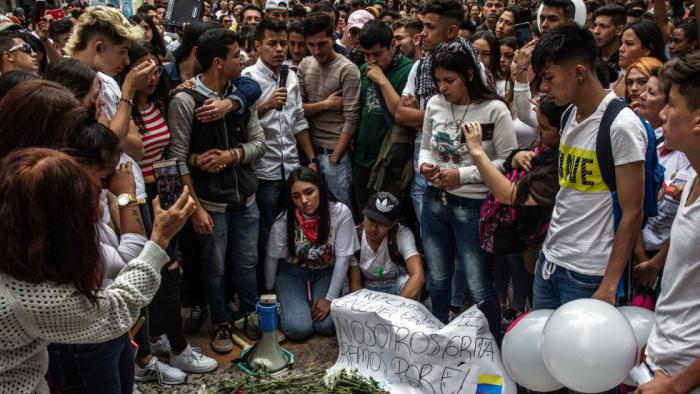
An article in the New York Times, referred to Colombia as the country of postponed emergencies, described the story of 18-year-old student Dilan Cruz, who was demanding access to higher education, along with thousands of other young people, when he was killed by the Colombian police riot squad on November 23, the day he graduated from high school.
I begin my comment with the use of this piece of information and with the warning that there are truths that cannot be hidden: what is happening in Colombia today is one of these.
This country, perhaps like very few others in the region, knows very well the scourges of violence, terror, drug trafficking, a powerful paramilitary presence, and also the lack of a coherent policy on the part of right-wing governments to put an end to total impunity, and disguised actions by officials and heads of state, who are content to coexist with this reality.
Within this political and social framework, guerrilla movements have emerged, and do exist, that have not been able to unite as a single force, coexisting and suffering in a universe of military action, terrorist acts carried out by paramilitary forces, as well as the free reign of drug traffickers protected by those who receive large sums of money to keep the army and police out of their way.
It is common to hear that in Colombia government power is held by countless threads, including those of the drug lords and paramilitaries.
Fifty years of war, during which hundreds of thousands of people were killed and wounded, appeared to have come to an end when the FARC guerrillas and the government of then President Juan Manuel Santos, after long talks and an international effort to prevent their failure, a Peace Agreement was signed in Havana, considered the most important event in Colombia in years.
Meanwhile, the other guerrilla movement, the National Liberation Army (ELN), initiated peace talks with the government, which were abruptly ended when President Ivan Duque took office in 2018.
The new President, from the Democratic Center party, seems to be moved by the skillful maneuvering of Álvaro Uribe, who has always intended to destroy the Peace Accords and maintain, if not direct support, the necessary discretion for paramilitaries to continue imposing their law, that of killing former guerrillas, campesinos, indigenous peoples, and social leaders committed to peace.
Uribe, in addition to having participated in political efforts opposing all aspects to the peace process with the guerrillas, has a long history of links with sectors interested in destabilizing Venezuela and is also opposed to any integration process in the region.
For this gentleman, Latin America must never become a zone of peace, as asserted by the Community of Latin American and Caribbean States (Celac), since this would end any justification of the impunity enjoyed by paramilitary groups.
Let us not forget that within Colombian territory there are nine U.S. military bases, not infrequently denounced for crimes, or that the United States is the world's largest drug consumer.
Colombia suffers from a true metastasis that, thanks to Álvaro Uribe and his followers, have made the Venezuelan border a conflict zone, where paramilitaries enter the Bolivarian Republic to carry out terrorist attacks on the inconvenient neighbor’s soil and where forces, supported by Duque, brought self-proclaimed Venezuelan president, Juan Guaidó, to Colombian territory under the leadership and protection of a group known as "Los Rastrojos,”
Today Colombia is seething with confrontation between the people and a neoliberal government, which implements measures contrary to the needs of its citizens and spends more time and money attempting to destabilize Venezuela than contributing to its own country, for those who suffer from poverty, the high cost of higher education, and citizen insecurity.
The massive demonstrations in recent weeks began with rejection of labor reform and pension policies of the Ivan Duque government. But they have been expanding in a way that now demands the resignation of the President, the dismantling of the Mobile Anti-Disturbance Squadron (Esmad), which has already caused several deaths and left more than 700 injured.
I conclude with an authoritative opinion on Colombia, from the British economist James Robinson, professor at the University of Chicago, who argues: "The elite in Colombia live as if they were in the first world, in a country predominantly poor and among the most unequal.”
Co-author of the book Why Nations Fail, Robinson argues that "a country's prosperity depends on social, political, and economic inclusion. And in the case of Colombian, he says, exclusion generates wars, poverty, and drug trafficking, according to an interview with BBC Mundo.
Given all of this, I believe it will be very difficult, but possible and necessary, to find a cure for the Colombian metastasis.








